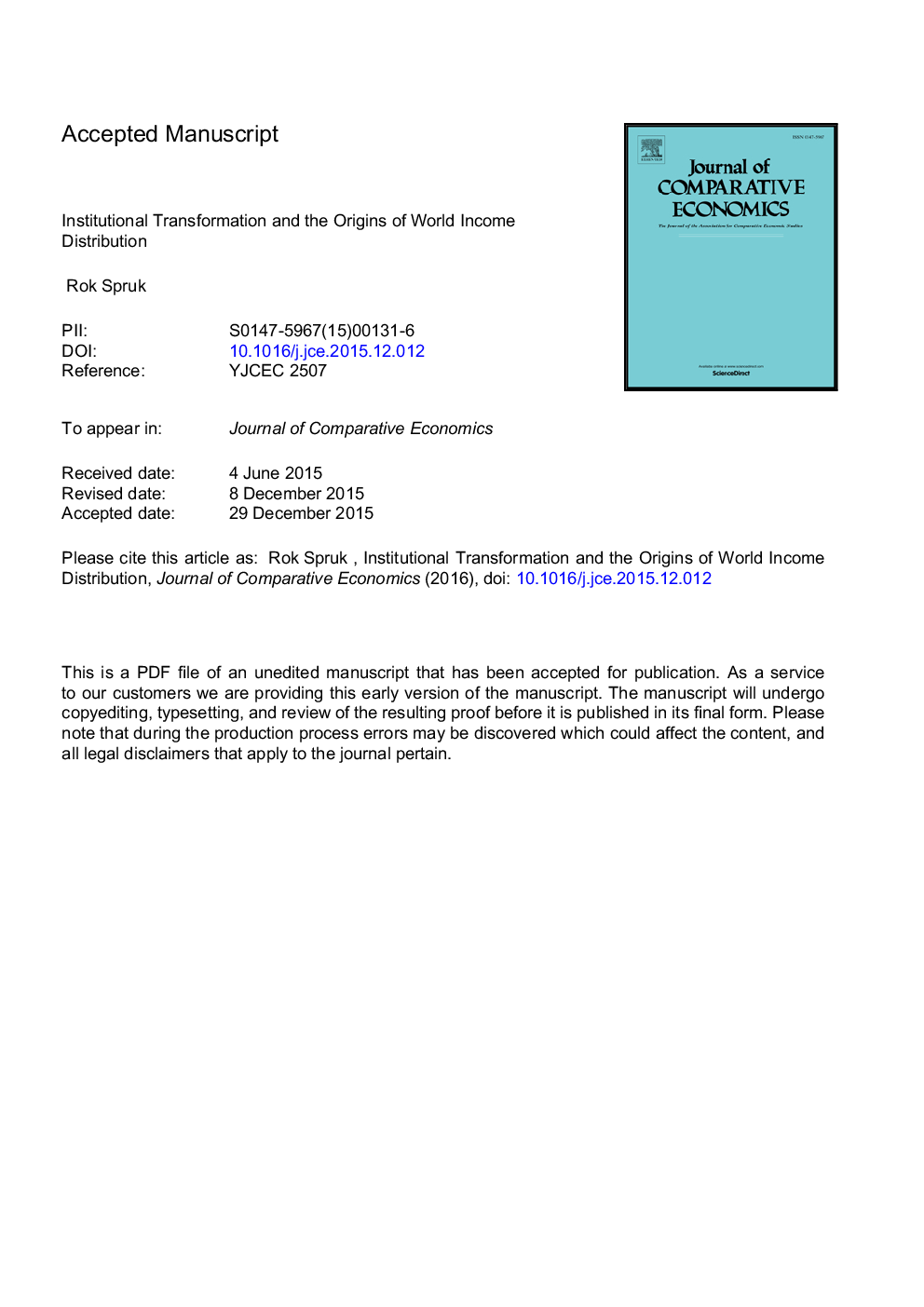| کد مقاله | کد نشریه | سال انتشار | مقاله انگلیسی | نسخه تمام متن |
|---|---|---|---|---|
| 5092148 | 1375916 | 2016 | 41 صفحه PDF | دانلود رایگان |
عنوان انگلیسی مقاله ISI
Institutional transformation and the origins of world income distribution
ترجمه فارسی عنوان
تحولات نهادی و منشا توزیع درآمد جهانی
دانلود مقاله + سفارش ترجمه
دانلود مقاله ISI انگلیسی
رایگان برای ایرانیان
ترجمه چکیده
این مقاله تلاشی برای اندازه گیری تغییرات نهادی و بررسی اثرات متقابل نهادهای سیاسی و حقوقی سیاسی در مسیر رشد اقتصادی و توسعه بلند مدت در یک گروه بزرگ از کشورها در دوره 1810-2000 را نشان می دهد. با استفاده از تحلیل عاملی، شاخص های پنهان از نهادهای سیاسی و عملی، با بهره گیری از چندین مجموعه اطلاعاتی موجود، ساخته می شوند. شواهد تجربی به طور مداوم نشان می دهد که جوامع با نهادهای سیاسی فراگیر در آمریکای لاتین، آسیای جنوبی، شرق میانه و اروپای شرقی به طور سیستماتیک رشد اقتصادی بلندمدت را بدتر کرده اند و با غرب همخوانی ندارند. شواهد نشان می دهد که اولویت تفاوت های نهادی واقعی در میان موسسات دولتی باعث افزایش رشد و رشد اقتصادی در طول زمان می شود. این همچنین توضیح می دهد که چرا قدرت سیاسی متضاد و رژیم های سیاسی استخراجی مانع رشد اقتصادی در مواجهه با موانع مداومی برای مشارکت در اقدام جمعی شده اند. در بلندمدت، اختلافات نهادی تا حدود دو سوم مسیر توسعه در داخل کشور و تا 83 درصد از شکاف توسعه در میان کشورها را تشکیل می دهد.
موضوعات مرتبط
علوم انسانی و اجتماعی
اقتصاد، اقتصادسنجی و امور مالی
اقتصاد و اقتصادسنجی
چکیده انگلیسی
This paper presents an attempt to quantify institutional changes and examine the respective effects of de jure and de facto political institutions on the path of long-run economic growth and development for a large panel of countries in the period 1810-2000. Using factor analysis, latent indices of de jure and de facto political institutions are constructed by exploiting several existing institutional datasets. The empirical evidence consistently suggests that societies with more extractive political institutions in Latin America, South Asia, Middle East and Eastern Europe have achieved systematically slower long-run economic growth and failed to catch-up with the West. The evidence confirms the primacy of de facto institutional differences over de jure institutions in causing differential growth and development outcomes over time. It also explains why highly concentrated political power and extractive political regimes inhibited the path of economic growth by setting persistent barriers to the engagement in collective action. In the long run, institutional differences account for up to two thirds of within-country development path and up to 83% of between-country development gaps.
ناشر
Database: Elsevier - ScienceDirect (ساینس دایرکت)
Journal: Journal of Comparative Economics - Volume 44, Issue 4, November 2016, Pages 936-960
Journal: Journal of Comparative Economics - Volume 44, Issue 4, November 2016, Pages 936-960
نویسندگان
Rok Spruk,
